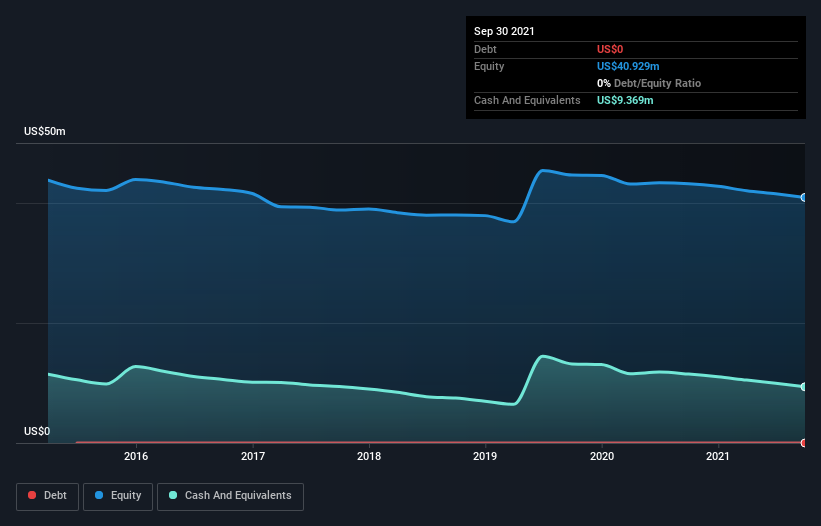- Canada
- /
- Oil and Gas
- /
- TSXV:FO
We Think Falcon Oil & Gas (CVE:FO) Can Easily Afford To Drive Business Growth

Just because a business does not make any money, does not mean that the stock will go down. For example, biotech and mining exploration companies often lose money for years before finding success with a new treatment or mineral discovery. But while history lauds those rare successes, those that fail are often forgotten; who remembers Pets.com?
Given this risk, we thought we'd take a look at whether Falcon Oil & Gas (CVE:FO) shareholders should be worried about its cash burn. For the purposes of this article, cash burn is the annual rate at which an unprofitable company spends cash to fund its growth; its negative free cash flow. The first step is to compare its cash burn with its cash reserves, to give us its 'cash runway'.
Check out our latest analysis for Falcon Oil & Gas
When Might Falcon Oil & Gas Run Out Of Money?
A cash runway is defined as the length of time it would take a company to run out of money if it kept spending at its current rate of cash burn. As at September 2021, Falcon Oil & Gas had cash of US$9.4m and no debt. In the last year, its cash burn was US$2.1m. That means it had a cash runway of about 4.4 years as of September 2021. There's no doubt that this is a reassuringly long runway. Depicted below, you can see how its cash holdings have changed over time.

How Is Falcon Oil & Gas' Cash Burn Changing Over Time?
In our view, Falcon Oil & Gas doesn't yet produce significant amounts of operating revenue, since it reported just US$4.0k in the last twelve months. Therefore, for the purposes of this analysis we'll focus on how the cash burn is tracking. With cash burn dropping by 4.0% it seems management feel the company is spending enough to advance its business plans at an appropriate pace. Admittedly, we're a bit cautious of Falcon Oil & Gas due to its lack of significant operating revenues. We prefer most of the stocks on this list of stocks that analysts expect to grow.
How Easily Can Falcon Oil & Gas Raise Cash?
Even though it has reduced its cash burn recently, shareholders should still consider how easy it would be for Falcon Oil & Gas to raise more cash in the future. Issuing new shares, or taking on debt, are the most common ways for a listed company to raise more money for its business. Many companies end up issuing new shares to fund future growth. By looking at a company's cash burn relative to its market capitalisation, we gain insight on how much shareholders would be diluted if the company needed to raise enough cash to cover another year's cash burn.
Falcon Oil & Gas has a market capitalisation of US$134m and burnt through US$2.1m last year, which is 1.6% of the company's market value. So it could almost certainly just borrow a little to fund another year's growth, or else easily raise the cash by issuing a few shares.
How Risky Is Falcon Oil & Gas' Cash Burn Situation?
It may already be apparent to you that we're relatively comfortable with the way Falcon Oil & Gas is burning through its cash. In particular, we think its cash runway stands out as evidence that the company is well on top of its spending. Its weak point is its cash burn reduction, but even that wasn't too bad! After considering a range of factors in this article, we're pretty relaxed about its cash burn, since the company seems to be in a good position to continue to fund its growth. On another note, Falcon Oil & Gas has 2 warning signs (and 1 which is potentially serious) we think you should know about.
Of course Falcon Oil & Gas may not be the best stock to buy. So you may wish to see this free collection of companies boasting high return on equity, or this list of stocks that insiders are buying.
New: AI Stock Screener & Alerts
Our new AI Stock Screener scans the market every day to uncover opportunities.
• Dividend Powerhouses (3%+ Yield)
• Undervalued Small Caps with Insider Buying
• High growth Tech and AI Companies
Or build your own from over 50 metrics.
Have feedback on this article? Concerned about the content? Get in touch with us directly. Alternatively, email editorial-team (at) simplywallst.com.
This article by Simply Wall St is general in nature. We provide commentary based on historical data and analyst forecasts only using an unbiased methodology and our articles are not intended to be financial advice. It does not constitute a recommendation to buy or sell any stock, and does not take account of your objectives, or your financial situation. We aim to bring you long-term focused analysis driven by fundamental data. Note that our analysis may not factor in the latest price-sensitive company announcements or qualitative material. Simply Wall St has no position in any stocks mentioned.
About TSXV:FO
Falcon Oil & Gas
An oil and gas company, engages in the exploration and development of unconventional oil and gas assets in Australia, South Africa, and Hungary.
Slight with mediocre balance sheet.
Market Insights
Community Narratives



